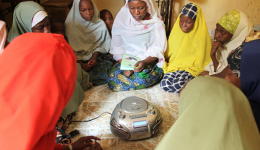The use of ICT and new media shows huge potential in increasing demand and utilization of the commodities. However, there is limited evidence of e- and m-health interventions from low-resource settings. While SMS reminders are a common intervention, there is less known about what other interventions have been, or are currently, being implemented, what their challenges and successes have been, and what (preliminary) results they have shown. Furthermore, there has been a call for mHealth interventions to be guided by behavior change theory yet limited literature exists to document projects that have explicitly used these theories. There is a need to capture and disseminate evidence being generated in programs that is not reported in the literature.
“Utilizing ICT in Demand Generation for Reproductive, Maternal, Newborn and Child Health: Three Case Studies and Recommendations for Future Programming” highlights three case studies of programs that utilized information and communication technology (ICT) and new media, specifically mobile technology, as part of an integrated strategy to increase demand for RMNCH health commodities in low-resource settings. These illustrative examples showcase examples of ICT and new media targeted at both providers and families, and highlight the use of behavior change theory to guide media selection.
The three case studies are:
Case Study #1: Mobile Alliance for Maternal Action (MAMA)
The MAMA Program uses mobile technology to improve the health and nutrition outcomes among pregnant women and new mothers and their infants in Bangladesh and South Africa.
Case Study #2: The Ananya Program
Targeting providers and consumers, the Ananya Program uses mobile technology and mass media to increase the knowledge of health providers and educate consumers in an effort to generate demand for and utilization of maternal, infant and child health services in India.
Case Study #3: Mobile Technology for Community Health (MOTECH)
The MOTECH initiative aims to determine how to use mobile phones to increase the quantity and quality of prenatal and neonatal care in rural Ghana, with a goal of improving the health outcomes for mothers and their newborns. The ICT approach includes mobile technology aimed at both health providers and consumers.
Based on these case studies, recommendations for utilizing ICT in demand generation programs for RMNCH are provided.
For further information and tools related to ICT for demand generation, see the Additional Resources on the right sidebar or in the document library.


 This website is made possible by the support of the American People through the
This website is made possible by the support of the American People through the